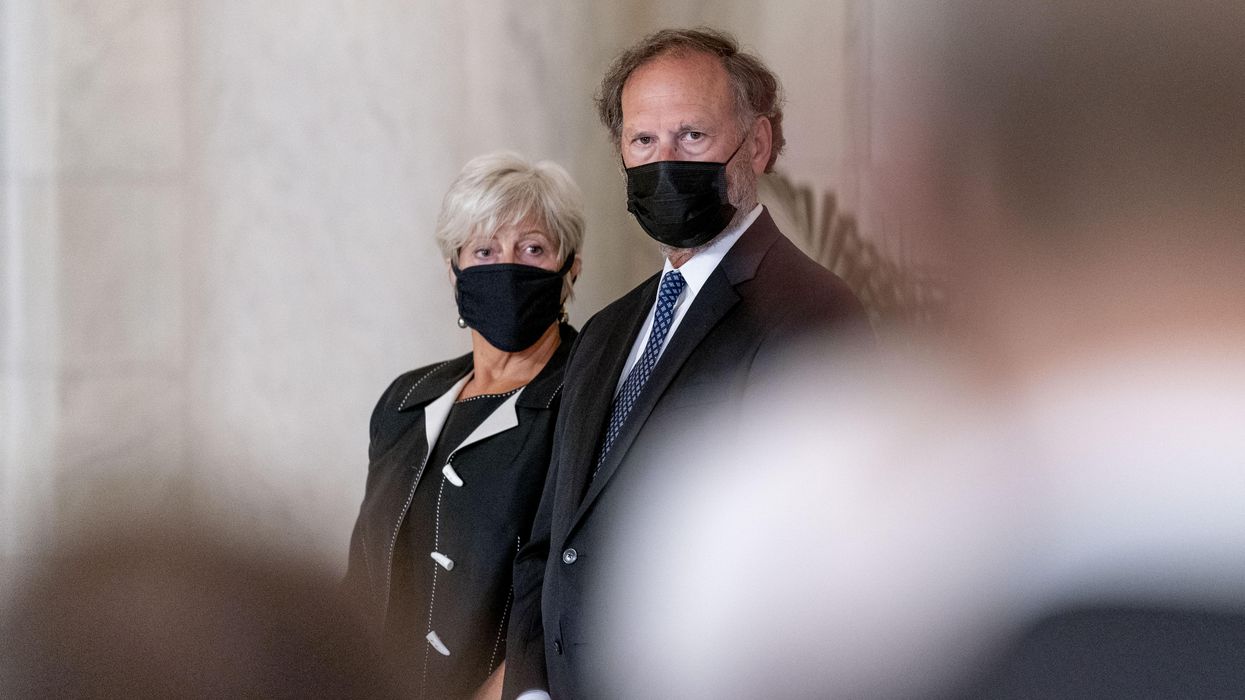President Trump's scattershot effort to reverse his election rejection has received a last-minute lifeline from the Supreme Court. It's about the diameter of a single strand of hair, which is just enough to unite allies and opponents in the same response: So you're saying there's a chance.
Justice Samuel Alito on Sunday speeded up the schedule for Trump's allies to explain their reason for trying to reverse the election results in Pennsylvania. The new deadline is Tuesday, significant because after that the result is immune from challenges and slates of electors may not be spurned in Congress.
The previous timetable was after that "safe harbor" deadline in federal law, meaning any ruling in Trump's favor would have come too late. Theoretically, the justices could now act in time to keep his crusade alive. But election law experts say it's much likelier Alito will actively put a spike in it rather than passively watch time expire.
Nonetheless, getting the case this far is only the latest example of how Trump's assertive contempt for the norms of electoral democracy, which have held fast for longer than two centuries, have done more than create fresh if unjustified reasons for millions of Americans to distrust their government. His assault has also created challenges to the balance of power that some of his most conservative legal allies find off-putting.
Many Trump supporters, though, still see his fight as worth having. The freshest polling about views of the election, released Monday by Gallup and the Knight Foundation, found 89 percent of Republicans concluding the democratic process did not work well this year, 82 percent of GOP voters describing the election outcome as swayed by misinformation and just 17 percent of them believing the media accurately called President-elect Joe Biden the winner.
That happened four days after Election Day, when enough votes had been tabulated in Pennsylvania to make it clear Biden would carry the state's 20 electoral votes. Three weeks later, Democratic Gov. Tom Wolf certified final results showing Biden had won with an 82,000-vote margin.
Republicans led by Rep. Mike Kelly, one of Trump's earliest enthusiasts in Congress, then unveiled an extraordinary argument for why Trump should win anyway: The General Assembly exceeded its authority when it authorized universal, no-excuse absentee voting — so all 2.7 million ballots cast by mail this fall should be thrown out.
Either Trump should be allowed to claim victory based only on the 4.2 million votes cast on Election Day, Kelly argues, or else the Republican-controlled legislature should be allowed to pick electors backing the president.
The state Supreme Court unanimously dismissed the case nine days ago, ruling the GOP waited way too long to challenge the law, enacted more than a year ago with bipartisan support. That court also rebuffed Kelly's contention that no-excuse mail voting violates the state Constitution as now written and so only a statewide ballot referendum altering that document would make the process valid.
Alito, who handles emergency matters that arrive at the high court from a handful of states including Pennsylvania, at first said he'd give Kelly until Wednesday to finish his appeal. Advancing the deadline to Tuesday morning gives the court only 15 hours to act if it chooses to do so. Otherwise, Alito could put an end to the matter on his own.
"I would not read too much into this," Rick Hasen, an election law professor at the University of California-Irvine, wrote in a blog post Sunday. "It shows more respect to the petitioners, and does not make it look like the court is simply running out the clock on the petition. I still think the chances the court grants any relief on this particular petition are virtually zero."
The main reason, he and other election law experts say, is that Kelly is challenging the Pennsylvania Supreme Court's interpretation of state law. And, consistent with the conservative philosophies of most of the justices, the U.S. Supreme Court has declined in a steady stream of election law cases this year to second-guess voting rules set by state legislatures or how state courts have interpreted them.
"All the PA Supreme Court did was to hold that the state legislature didn't violate the state constitution in expanding mail-in voting," University of Texas law professor Steve Vladek tweeted. "But the U.S. Constitution has *nothing to say* about how state courts enforce their own constitutions against state legislatures. Full stop."
The Electoral College will convene a week from now in all 50 state capitals and D.C. Biden for now can expect 306 of their votes, to 232 for Trump — so even an extraordinary move by the Supreme Court invalidating the Pennsylvania outcome would leave Biden with a dozen more electoral votes than the majority required.




















Trump & Hegseth gave Mark Kelly a huge 2028 gift